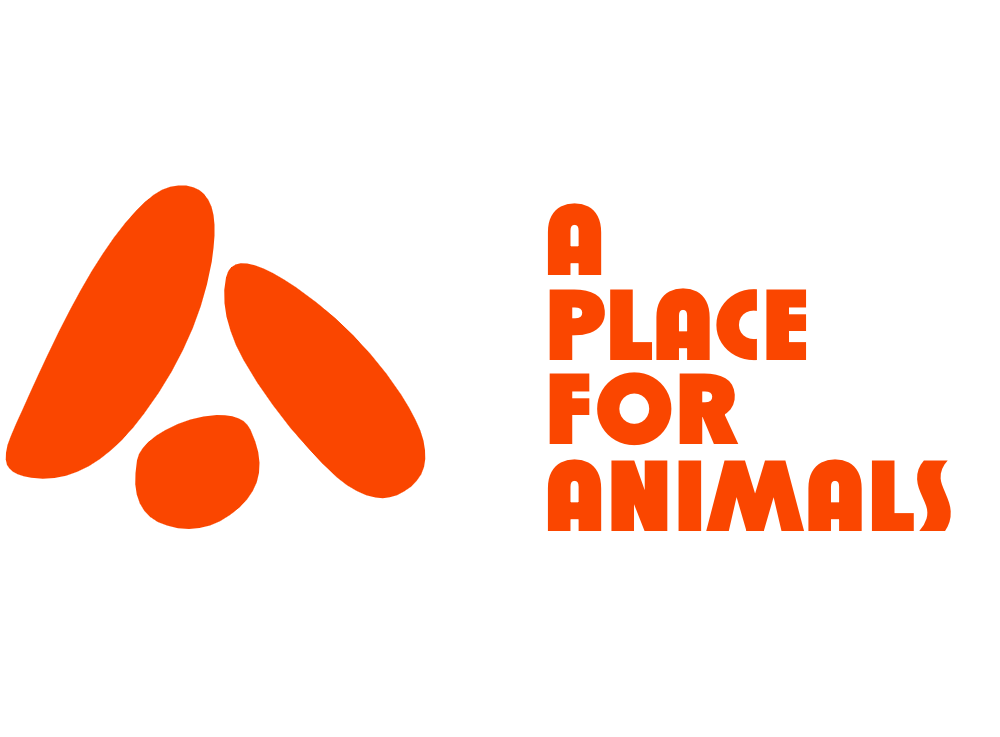Dogs
Can Dogs Have Beets?
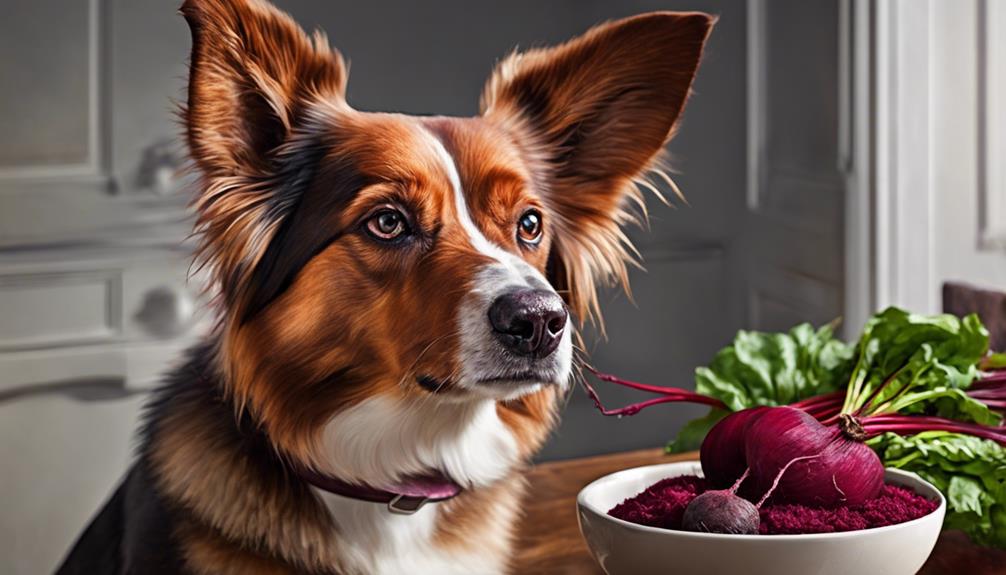
Yes, dogs can have beets. Beets offer benefits like boosting the immune system with antioxidants. Cut beets into small pieces for safe feeding, and monitor for any issues. Prefer cooked beets for easier digestion. Overfeeding can lead to problems due to high oxalic acid and sugar content. Cooking methods like baking or roasting enhance taste and ease of consumption. Incorporate beets in meals for added fiber. And remember to consult your vet for guidance. Beets can be a healthy addition to your dog's diet when given in moderation and with care. More insights on beets for dogs await.
Key Takeaways
- Beets are safe for dogs in moderation.
- Cooked beets are easier for digestion.
- Monitor for digestive upset or allergies.
- Overfeeding can lead to health risks.
- Incorporate beets gradually into meals.
Health Benefits of Beets for Dogs
When considering the health benefits of beets for dogs, it becomes evident that their rich nutritional profile can positively impact various aspects of a dog's well-being. Beets are packed with vitamins and minerals essential for a dog's health. These nutrients can aid in boosting the immune system, helping your furry friend stay strong and fight off illnesses. Additionally, the antioxidants and anti-inflammatory properties found in beets can further support your dog's overall health.
It's important to remember that while beets offer numerous health benefits, they should be given in small quantities. This is because beets contain oxalic acid, which can be harmful if consumed in large amounts. By incorporating beets into your dog's diet in moderation, you can provide them with additional nutrients that can contribute to their well-being. From promoting skin and coat health to supporting the immune system, the health benefits of beets for dogs make them a valuable addition to their diet.
Safe Ways to Feed Beets
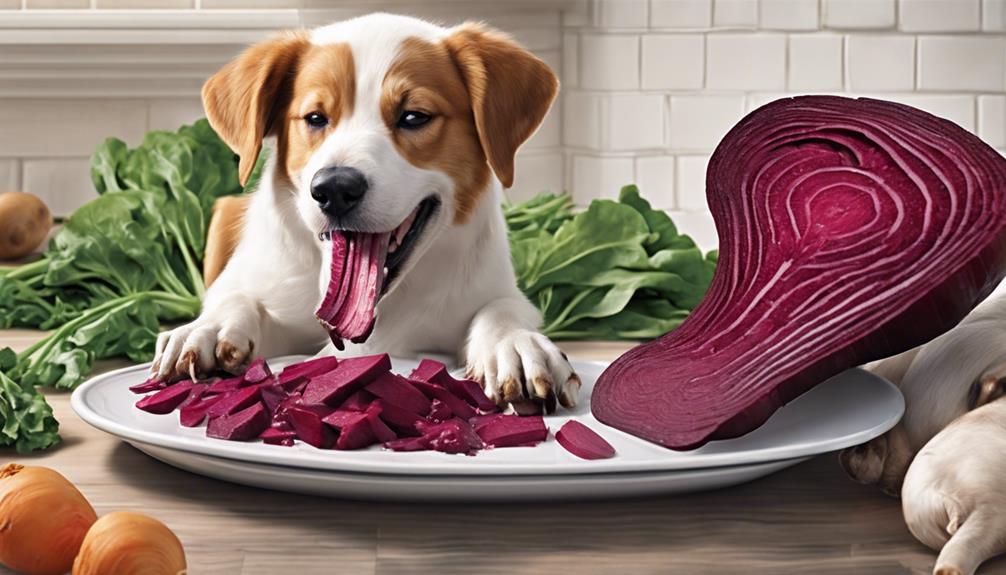
After discussing the health benefits of beets for dogs, it's crucial to understand the safe ways to feed beets to your furry companion. When it comes to feeding beets to your dog, keep the following points in mind:
- Cut into Small Pieces: Whether raw or cooked, make sure to cut the beets into small, easily digestible pieces for your dog to eat comfortably.
- Monitor Your Dog: Keep an eye on your dog when introducing beets into their diet. Monitor for any signs of digestive upset or allergies.
- Cooked is Preferred: While beets can be fed raw, most prefer feeding cooked beets to dogs as they're easier to digest. Baking, roasting, or boiling are suitable cooking methods for preparing beets for your furry friend.
Feeding beets to your dog can be a healthy addition to their diet, but always remember to introduce new foods gradually and in moderation to safeguard your dog's well-being.
Risks of Overfeeding Beets
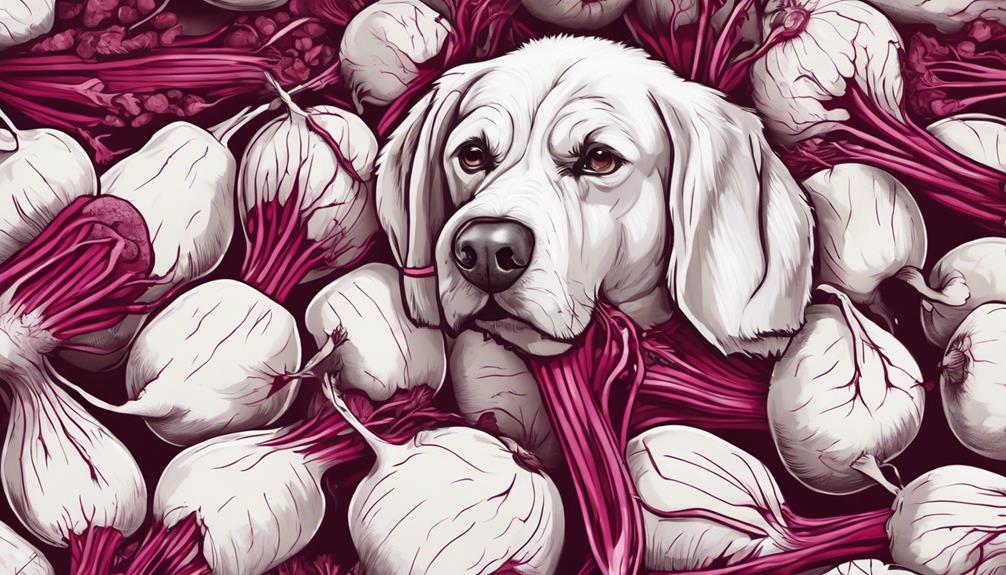
Overfeeding beets to dogs can pose various health risks that pet owners should be mindful of. Beets are high in oxalic acid, which can lead to urinary tract issues in dogs if consumed excessively. Additionally, excessive consumption of beets can result in calcium deficiencies in dogs, affecting their overall health.
Due to their high sugar content, overfeeding beets to dogs may contribute to obesity and increase the risk of pancreatitis. Dogs can also experience digestive problems such as gas and diarrhea when they consume an excessive amount of beets.
To prevent these health risks, it's important to limit the quantity of beets fed to dogs and monitor a balanced diet. Keeping an eye on the portions and monitoring your pet's overall well-being can help avoid potential complications associated with overfeeding beets. Remember, moderation is key to maintaining your dog's health and happiness.
Cooking Beets for Dogs

Cooking beets for dogs can be done by baking, roasting, or boiling to guarantee easy digestion and maximize nutritional benefits.
- Baking: Baking beets can help bring out their natural sweetness and make them soft for your dog to eat.
- Roasting: Roasting beets can enhance their flavor and texture, providing a tasty treat for your furry friend.
- Boiling: Boiling beets is a simple method that can soften the vegetable, making it easier to incorporate into your dog's meal.
When preparing beets for your dog, remember that cooked beets are preferable over raw beets as they can be hard to digest when raw. Opt for plain and unseasoned beets to avoid any potential digestive issues.
Incorporating Beets Into Meals
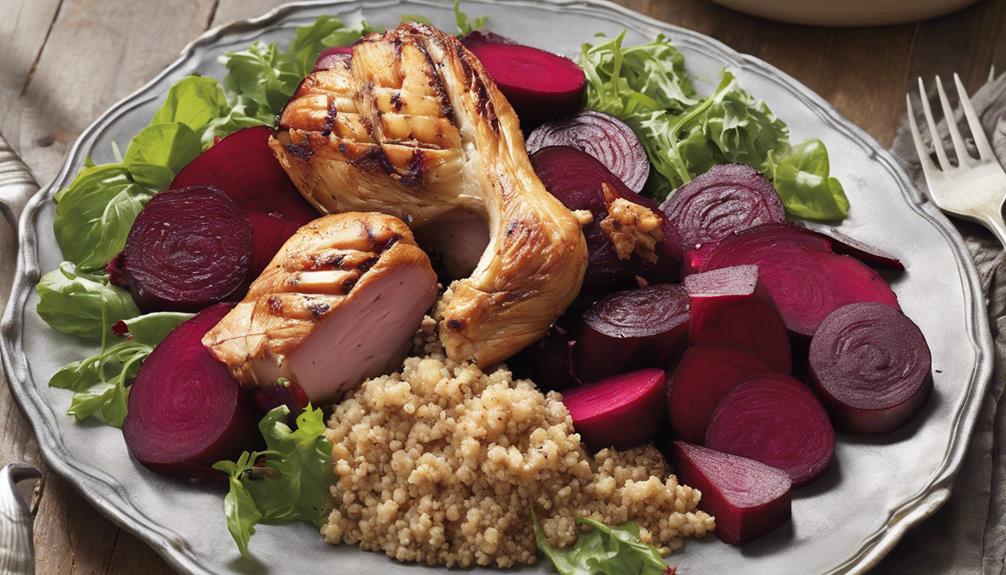
When incorporating beets into your dog's meals, consider mashing them for added fiber and essential nutrients. Shredded beets can also serve as a nutritious and colorful topping for your dog's regular food. Another creative idea is making Red Velvet Cupcakes with beets for a special and healthy treat. Beets are safe for your dog to eat, providing additional vitamins, minerals, and antioxidants to their diet. When feeding your dog organic beets, you guarantee they are free from harmful chemicals. By giving your dog a balanced meal with a good protein source along with beets, you are offering a tasty and beneficial addition to their meals. Below is a table summarizing the benefits of incorporating beets into your dog's diet:
| Benefits of Beets for Dogs |
|---|
| Source of fiber |
| Provides essential nutrients |
| Adds color to meals |
Consulting Your Vet Before Feeding

Before introducing beets into your dog's diet, consulting your vet is important for personalized guidance on portion sizes and frequency. Your vet can evaluate your dog's health, dietary needs, and any potential allergies to guarantee a safe shift. Here are three key reasons why consulting your vet is vital:
- Dogs Consume Canned: Vets can advise on whether canned beets are appropriate for your dog's consumption.
- Beets Beneficial for Dogs: Vets can explain the advantages of beets for dogs, such as providing essential nutrients like vitamin C.
- Either Cooked or Raw: Your vet can suggest whether cooked or raw beets are better suited for your dog's digestive system.
Frequently Asked Questions
How Much Beets Can I Give My Dog?
We can give our dog beets in moderation. The recommended amount varies by breed size: around 1-2 tablespoons for small breeds, 2-3 tablespoons for medium breeds, and 3-4 tablespoons for large breeds.
It's important to monitor our dog's reaction and adjust the quantity based on their tolerance. Excessive beets can lead to digestive issues, so starting with small amounts is wise. Seeking advice from a veterinarian is essential for determining the appropriate serving size.
Is It Safe for Dogs to Eat Beets?
Yes, it's safe for dogs to eat beets in moderation. Beets offer fiber, vitamins, and minerals that benefit a dog's health. Cook them plain to avoid digestive issues.
Introduce beets gradually to monitor allergic reactions. Consult a vet before adding beets to your dog's diet. Think of beets like a nutritious treat for your furry friend, but always prioritize their well-being by ensuring it's suitable for them.
Are Beets Stems Toxic to Dogs?
Beet stems are safe for dogs and can provide fiber and nutrients when fed in moderation. They contain antioxidants that support a dog's immune system. To guarantee safety, use fresh stems, wash them well, and cut into small pieces.
Avoid feeding wilted or spoiled stems to prevent health risks. Moderation is crucial to prevent digestive issues like bloating. Including beet stems in your dog's diet can be beneficial, promoting overall health and well-being.
Do Beets Help Dog Allergies?
Beets can help alleviate dog allergies by reducing inflammation and supporting the immune system. The antioxidants in beets can lower allergic reactions, while vitamin C in beets aids in skin health, reducing itching.
Including beets in a dog's diet can improve overall skin health, benefiting allergy symptoms. Consulting with a veterinarian is important to determine if beets can specifically help your dog's allergy issues.
Conclusion
To sum up, beets can be a healthy addition to your dog's diet when fed in moderation.
Did you know that beets are high in fiber, which can aid in digestion and promote overall gut health for your furry friend?
Remember to consult your vet before introducing any new foods to your dog's diet to make certain it's safe and appropriate for their individual needs.
Keep your dog's health and well-being a top priority by making informed decisions about their nutrition.
Dana is our Lead Content Writer, bringing a wealth of knowledge and expertise to our team. With a background deeply rooted in animal studies and a profound love for all creatures, Dana is dedicated to crafting engaging and informative content that resonates with our audience. With Dana at the helm, you can trust that our content is accurate and engaging, catering to the diverse interests of animal enthusiasts everywhere.
Dogs
Unlocking the Meaning Behind Finley for Choosing the Perfect Dog Name
Delve into the profound significance of the name Finley for your dog's perfect moniker, discovering hidden depths that will shape a meaningful bond.
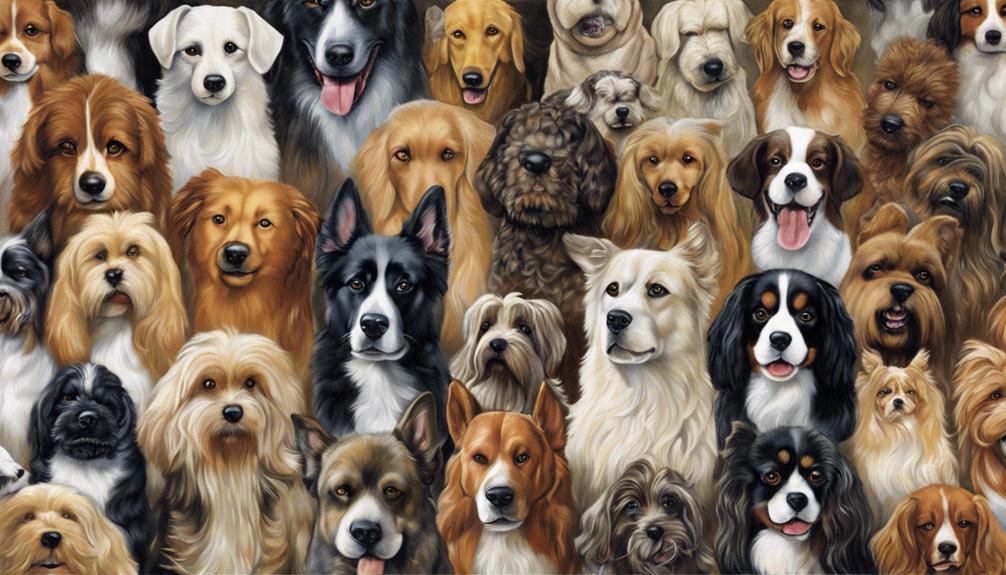
Deciphering the intricate layers of symbolism and meaning behind the name Finley is crucial to selecting the ideal moniker for your beloved canine companion. Finley is associated with strength, fairness, resilience, and honor, with numerology pointing to power and success. Rooted in Irish and Scottish cultures, it offers a rich tapestry of meanings. Consider factors like pronunciation, length, and your dog's demeanor. Embrace a name that resonates with your dog's unique traits, reflecting their identity with strength and creativity. Each aspect of Finley contributes to a harmonious bond with your furry friend's true essence, ensuring a perfect fit.
Key Takeaways
- Finley represents strength, fairness, power, and resilience.
- Numerology in Finley signifies ambition, success, and abundance.
- The name balances power, freedom, self-expression, and integrity.
- Finley is adaptable, rooted in Irish and Scottish cultures.
- Choose a dog name resonating with qualities, uniqueness, and a harmonious bond.
Finley Name Meaning
Exploring the significance of the name 'Finley' reveals its association with strength and fairness, making it a compelling choice for your dog. The name 'Finley' embodies the qualities of a fair warrior, reflecting both power and justice. This combination of attributes can resonate deeply with your furry companion, instilling a sense of resilience and integrity. When selecting a name for your dog, the meaning behind 'Finley' adds a layer of depth, giving your pet a name that signifies courage and honor.
If you have any further questions regarding the name 'Finley' or need assistance in choosing the perfect name for your dog, feel free to reach out to us via email at [email address]. We're here to provide you with guidance and support throughout this exciting journey of naming your beloved pet. Let the name 'Finley' be a beacon of strength and fairness in your dog's life, reflecting the noble qualities they possess.
Numerology Details of Finley Name

Numerology provides fascinating insights into the name Finley, revealing a balance of power and a yearning for freedom and self-expression.
With a mix of vowels and consonants, Finley's letters offer a harmonious combination, reflecting a desire for creativity and social connections.
Understanding these numerology details can help uncover the symbolic significance behind the name, offering a deeper understanding of its essence and potential influence.
Meaningful Numerology Insights
Revealing the significant numerology insights behind the name Finley sheds light on its importance and possible impact for your dog's identity.
The number 8 associated with Finley signifies ambition, success, and abundance, suggesting that your dog may embody these traits.
The Inner Dream Number 5 indicates a sense of adventure and freedom, making Finley a fitting choice for an energetic and spirited companion.
The Soul Urge Number 3 reflects creativity and communication skills, highlighting the potential for your dog to be expressive and sociable.
Additionally, the Hearts Desire Number 3 emphasizes a love for self-expression and enjoyment of life.
With 3 vowels and 5 consonants in its structure, Finley's numerology details align harmoniously, offering a name rich in meaning for your beloved pet.
Symbolism in Finley
Upon examining the numerology details of the name Finley, its symbolism reveals a tapestry of traits that may shape your dog's identity and behavior. With a numerology number of 8, Finley embodies power, success, and abundance, suggesting a strong and prosperous nature.
The Inner Dream Number 5 hints at a longing for freedom and adventure, portraying a dog with a spirited and explorative mindset. Additionally, the Soul Urge Number of 3 indicates a propensity towards creativity and self-expression, while the Hearts Desire Number 3 highlights a love for communication and social interactions.
The composition of Finley, with 3 vowels and 5 consonants, creates a balanced and harmonious sound that complements the name's diverse numerological influences.
Vowels & Consonants in Finley
Exploring the balance between vowels and consonants in Finley reveals the unique phonetic qualities that contribute to its charm as a dog name.
With 3 vowels (i, e, y) and 5 consonants (f, n, l, n, y) in its six-letter structure, Finley strikes a vital blend between the two.
This equilibrium of vowels and consonants plays an essential role in the name's aesthetic appeal, impacting its phonetic sound and overall flow.
The combination of these vowels and consonants in Finley creates a distinctive and memorable name for your canine companion.
By understanding how vowels and consonants work together in a name like Finley, you can secure a balanced and harmonious choice for your beloved pet.
Length of Finley Name
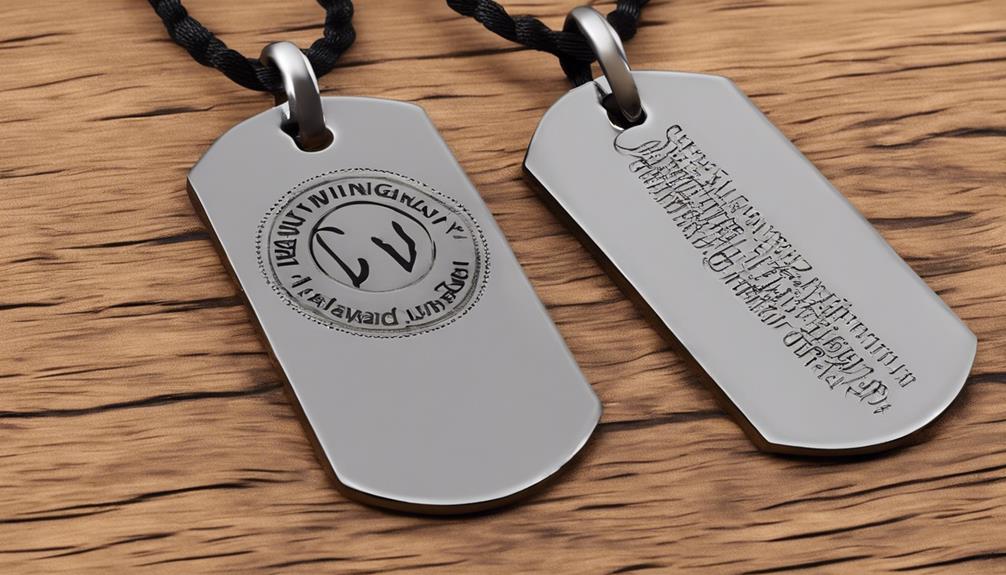
The length of the name Finley is just right – not too short and not too long.
It strikes a balance that makes it easy to pronounce and remember.
This makes Finley a great choice for a dog's name.
Finley: A Short Name
Discussing the length of the name Finley reveals its concise nature and guarantee of ease in daily interactions with your dog. With only 6 letters, Finley is a short and sweet name that your furry friend will quickly recognize. This assurance makes it easy to call out and ideal for getting your dog's attention promptly.
The balanced combination of 3 vowels and 5 consonants in Finley creates a harmonious sound that rolls off the tongue effortlessly. Despite its short length, Finley still maintains its distinctiveness, allowing room for potential nicknames if you desire.
This compact name guarantees clarity in communication with your dog while upholding a unique identity.
Finley: Easy to Pronounce
Moving from its short length, let's highlight how the name Finley's brevity contributes to its easy pronunciation and memorability.
With only six letters, Finley rolls off the tongue effortlessly, making it a simple yet distinctive choice for your furry friend.
The combination of three vowels and five consonants in Finley creates a balanced flow, aiding in the smooth pronunciation of the name.
This moderate length strikes a perfect harmony, ensuring that Finley is both memorable and easy to call out.
The phonetic simplicity of Finley's syllables and sounds makes it a straightforward name for your dog to recognize and respond to, fostering a strong bond between you and your beloved canine companion.
Finley: Memorable Sound
When selecting a dog name, considering the memorable sound created by the length of Finley is essential. Here are four reasons why the length of Finley contributes to its memorable sound:
- Easy to remember and pronounce: With 6 letters, Finley rolls off the tongue effortlessly.
- Balanced and harmonious: The 3 vowels and 5 consonants in Finley create a pleasing sound.
- Short and memorable: At 6 letters long, Finley strikes a perfect balance.
- Engaging flow and rhythm: The name Finley flows smoothly, making it enjoyable to call out.
Incorporating these aspects into your dog's name can enhance the bond between you and your furry friend, making communication more effective and enjoyable.
Dog Names Starting With Finley
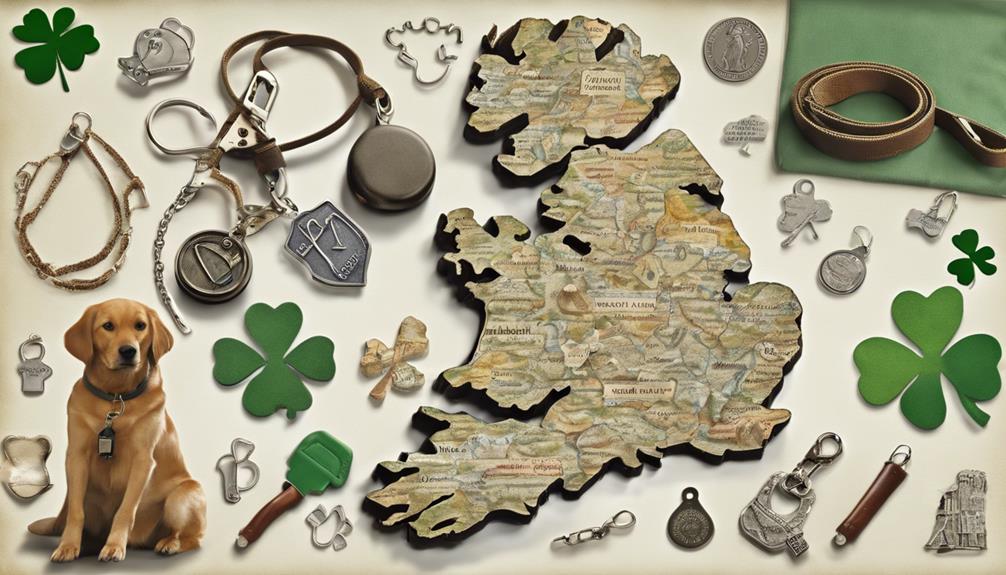
In exploring dog names starting with Finley, one can discover a range of options that embody strength and valor for their canine companions. The name Finley, meaning 'fair warrior,' is a unisex option suitable for both male and female dogs. With its balanced composition of 3 vowels and 5 consonants, Finley exudes harmony and resilience. Additionally, the numerology association of Finley with numbers 8, 5, and 3 adds depth to its significance, making it a powerful choice for your furry friend.
When selecting a dog name that begins with Finley, you aren't just choosing a name; you're choosing a symbol of bravery and fairness. Whether you have a courageous or gentle pup, a name like Finley sets the tone for a loyal and steadfast companion. Consider the qualities you admire in your dog and how a name starting with Finley can encompass those traits, creating a bond that goes beyond words.
Unique Traits of Finley Name
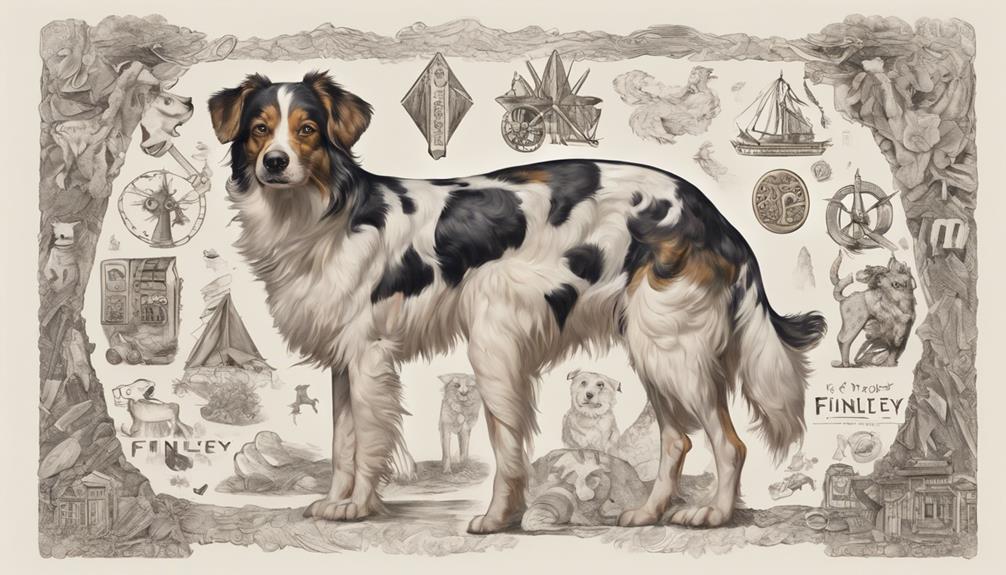
Exploring the unique traits of the name Finley sheds light on its symbolic significance and potential impact on your dog's persona. Here are four compelling aspects of the name Finley that make it stand out:
- Unisex Appeal: Being a unisex name, Finley is versatile and suitable for both male and female dogs, offering a sense of inclusivity and modernity to your pet's identity.
- Meaningful Definition: The name Finley, meaning 'fair warrior,' embodies qualities of strength and fairness, instilling a sense of valor and justice in your dog's character.
- Balanced Structure: With 3 vowels and 5 consonants, the name Finley possesses a harmonious and balanced structure, symbolizing stability and equilibrium in your dog's demeanor.
- Numerological Significance: Associated with numbers 8, 5, and 3, choosing the name Finley can add depth to your dog's persona, reflecting qualities such as ambition, adaptability, and creativity in their nature.
Selecting the name Finley for your canine companion can convey a message of resilience, nobility, and inner strength, shaping a unique and meaningful bond between you and your pet.
Religious Influences on Finley
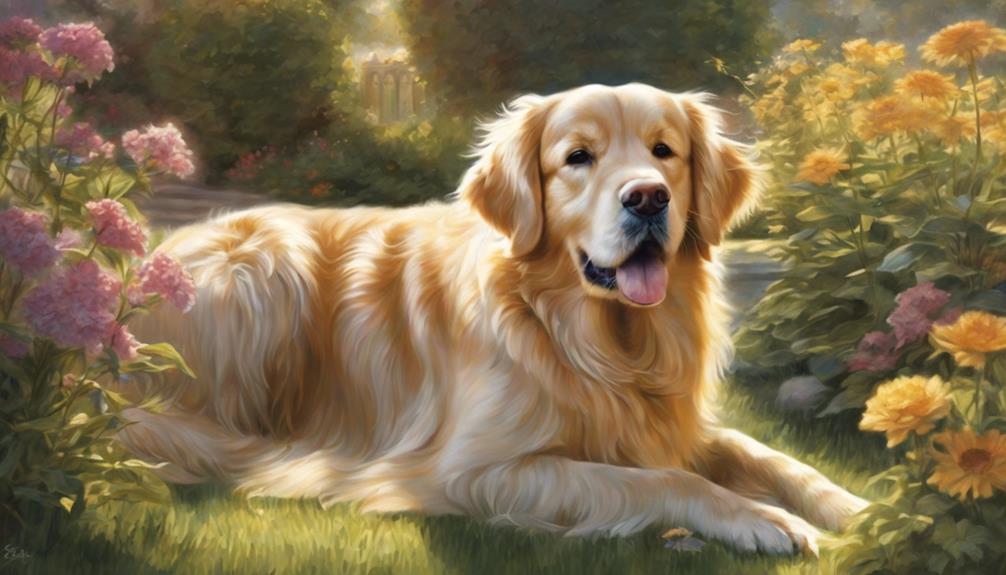
Rooted in Irish and Scottish cultures, the name Finley carries religious influences that underscore qualities of fairness and strength. In Christian traditions, Finley may symbolize these virtues, making it a meaningful choice for dog owners seeking to reflect these values in their pet's name.
The adaptability of Finley allows individuals from various religious backgrounds to find significance in the name. For some, the meaning of 'fair warrior' associated with Finley aligns with the principles of their faith, adding a layer of depth to the name selection process.
It's important to note that the religious significance of Finley can vary based on personal interpretations and connections. Whether chosen for its ties to fairness, strength, or warrior-like qualities, the religious undertones of Finley offer a rich tapestry of meanings for dog owners seeking a name with depth and significance.
Factors for Choosing Dog Names
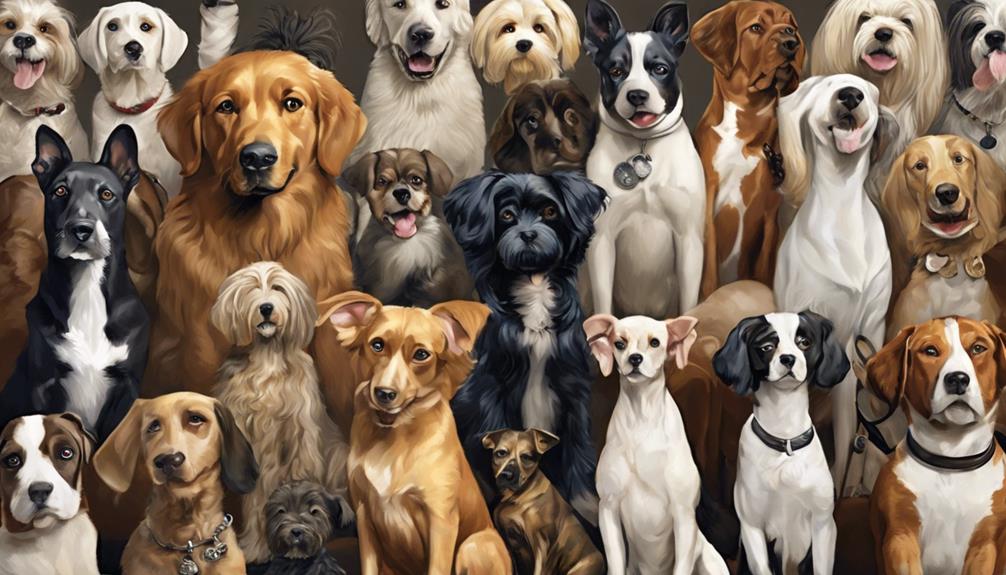
When selecting a name for your dog, consider various factors that can reflect their personality and traits. Here are some key points to keep in mind:
- Meaning: Choose a name that resonates with the qualities you see in your furry friend, such as bravery, loyalty, or playfulness.
- Sound: Opt for a name that's easy to pronounce and distinguish, ensuring your dog can recognize and respond to it quickly.
- Length: Consider a name of moderate length, like Finley, which isn't too short or too long, making it convenient for everyday use.
- Compatibility: Make sure the name you choose aligns with your dog's demeanor and character, creating a harmonious bond between the name and their identity.
Reflecting Your Dogs Identity
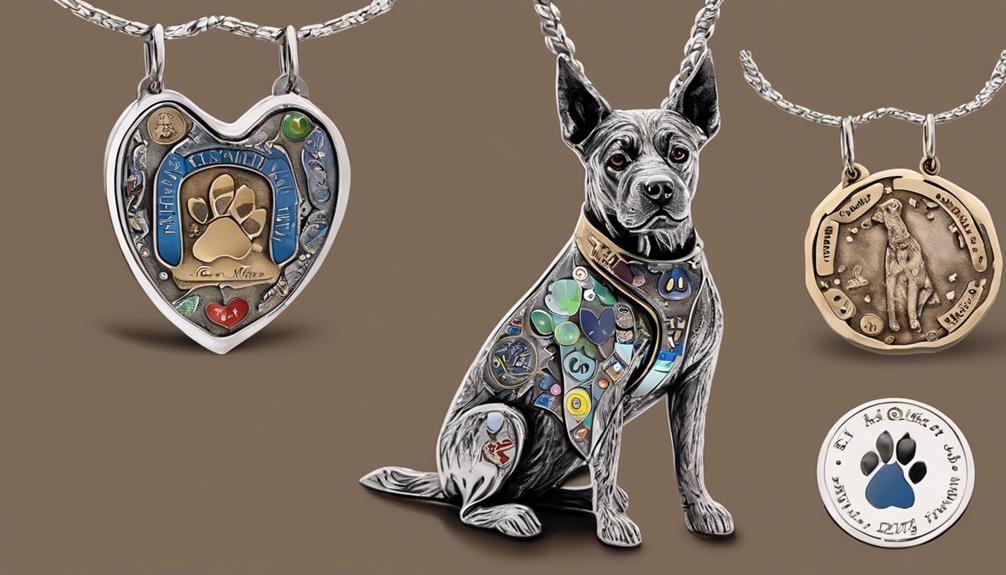
Reflecting your dog's identity involves understanding their unique traits and characteristics to choose a name that truly resonates with who they are.
When considering a name like Finley, meaning 'fair warrior,' you're embracing a moniker that embodies strength and fairness in your pet. The numerology of Finley reinforces this notion, with numbers 8, 5, and 3 highlighting qualities of power, versatility, and creativity.
With its balanced combination of vowels and consonants, the name Finley rolls off the tongue effortlessly, allowing for easy recognition and recall.
Frequently Asked Questions
What Does the Name Finley Mean for a Dog?
For a dog, the name Finley embodies strength, fairness, and balance. It reflects qualities of a brave and just companion. With 3 vowels and 5 consonants, it's easy to say and remember, making it a perfect choice.
What Does the Name Finley Represent?
Finley represents a blend of fairness, strength, balance, and success. Its structure with 3 vowels and 5 consonants offers a harmonious mix of sounds. With a soul urge number of 3, it embodies creativity, expression, and communication.
What Is the Personality of the Name Finley?
We see Finley as embodying determination, courage, and fairness. They possess a strong sense of justice, leadership, and integrity. The name suggests a balanced and honorable nature with warrior-like qualities. A name that resonates with strength and character.
What Does the Name Finn Mean for a Dog?
Finn for a dog embodies bravery and spirit, reflecting a sense of adventure and brightness. The name carries Celtic charm and a touch of heroism. It's perfect for an active companion who embodies the traits of wisdom and strength.
Conclusion
To wrap up, when picking a dog name like Finley, it's crucial to contemplate the significance, numerology, and unique characteristics linked with the name.
By comprehending these factors and mirroring your dog's identity, you can select a name that truly suits your canine companion.
Keep in mind, the name you select plays a significant role in shaping your dog's identity and how they're perceived by others.
So choose wisely and enjoy the journey of discovering the perfect name for your furry friend.
As our Editor-in-Chief, James plays a pivotal role in ensuring the quality and integrity of our content. With a keen eye for detail and a passion for storytelling, James oversees the editorial process here at A Place for Animals. With years of experience in content editing, James ensures that every piece of content meets our high standards of accuracy and clarity. Under James’ guidance, you can rest assured that the content you read is informative and impeccably crafted.
Dogs
Unraveling the Origin of the Poodles Name: A Historical Guide
On a quest to discover the meaning behind the Poodle's name, journey through history and uncover fascinating insights.
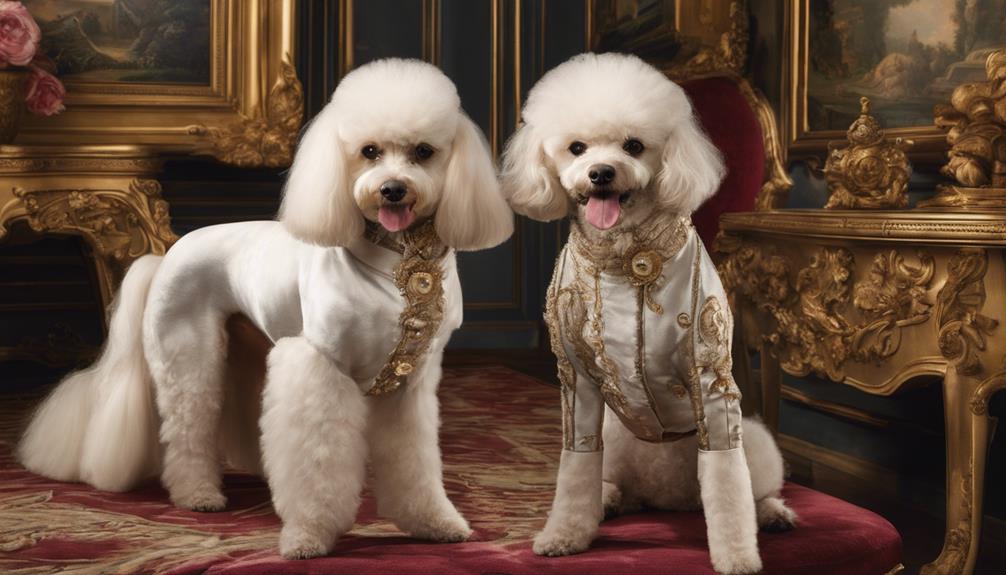
Uncovering the Poodle's name origins traces back to Germany's hunting legacy. 'Poodle' stems from 'Pudel,' meaning water splasher. Poodles excelled as water retrievers for hunters. Their heritage showcases a love for water activities. The breed's evolution birthed Standard, Miniature, and Toy sizes. Traits like intelligence and adaptability define Poodles. From nobility's companions to versatile roles, Poodles carved a unique place in history. Standard Poodles boast agility and brains. Their curly coats evolved for water insulation. Poodles' past offers a rich tapestry of skills. Further exploration reveals more about their fascinating journey.
Key Takeaways
- Originates from German word 'Pudel' meaning 'to splash in water'.
- Tied to Germany's hunting and fishing traditions.
- Reflects Poodles' role as skilled water retrievers.
- Etymology highlights water-loving retriever characteristics.
- Name showcases Poodles' historical connection to water activities.
Poodle Origins and Ancestry
Pondering the roots of the Poodle breed reveals a fascinating history intertwined with Germany's hunting and fishing traditions. The name 'Poodle' originates from the German word 'Pudel,' which translates to 'to splash in water.' This moniker perfectly encapsulates the breed's role as skilled water retrievers.
Originally bred in Germany, Poodles served as invaluable companions to hunters and fishermen, showcasing their exceptional abilities in water-related tasks. Their name not only signifies their ancestral connection to water activities but also highlights their historical role as proficient hunting dogs.
The etymology of 'Poodle' sheds light on the breed's origins as water-loving retrievers, showcasing their versatility and intelligence. As we explore the lineage of Poodles, we uncover a rich tapestry of heritage that intertwines with the essence of hunting and the allure of the water, shaping this breed into the beloved companions we're familiar with today.
The Evolution of Poodle Breeds
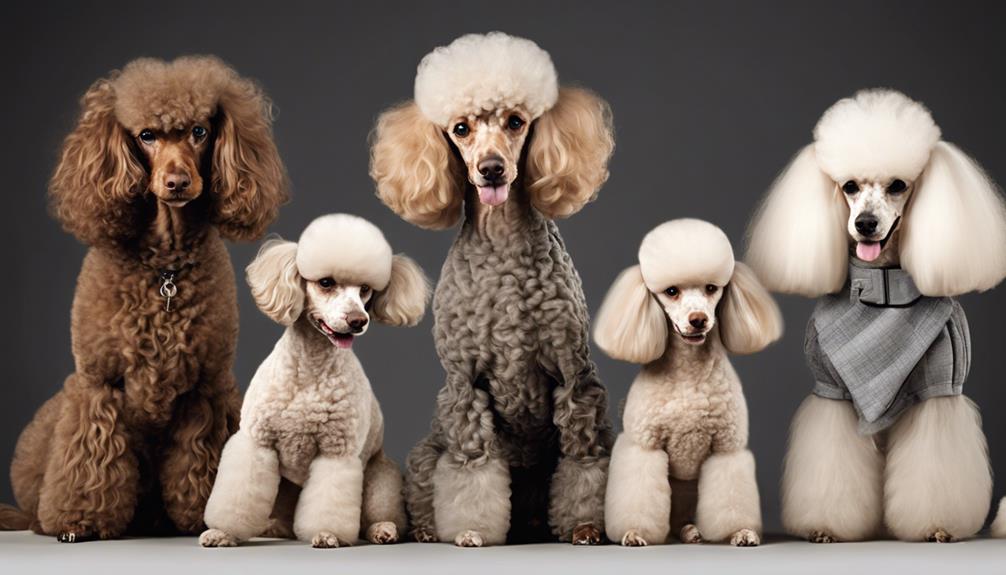
Poodles have undergone significant changes over the years, with early types evolving into the diverse variations seen today.
From the Standard to the Miniature and Toy sizes, each was bred with specific traits in mind.
The breeding process has refined characteristics like coat texture and size, shaping Poodles into the beloved breeds familiar to us today.
Early Poodle Types
Originating from distinct sizes with specific roles, early Poodle types, including Standards, Miniatures, and Toys, showcased their versatility and adaptability in fulfilling various tasks. Standard Poodles, bred for water retrieval, exhibited intelligence and elegance while excelling in their purpose.
Miniature Poodles, initially utilized for truffle hunting, demonstrated adaptability in diverse environments. Toy Poodles, developed for companionship and entertainment, evolved to suit urban lifestyles with their compact size and charming demeanor.
The evolution of these Poodle breeds highlighted their hallmark traits of intelligence, elegance, and adaptability, setting a strong foundation for the modern variations we see today. The distinct sizes and purposes of these early Poodle types laid the groundwork for the breed's enduring popularity and diverse capabilities.
Modern Breed Variations
After showcasing their versatility and adaptability in fulfilling various tasks, early Poodle types paved the way for the evolution of modern breed variations.
- The Standard Poodle, known for its intelligence and athleticism, excels as a water retriever, staying true to its origins as a hunting companion.
- The Miniature Poodle, initially bred for truffle hunting, demonstrates the breed's ability to adapt to different roles, showcasing its versatility.
- Toy Poodles, developed for companionship and entertainment purposes, highlight the breed's adaptability to fulfilling roles beyond traditional working functions.
These variations in Poodle breeds reflect their diverse capabilities and the evolution of the breed to suit different lifestyles and preferences.
Breeding for Traits
Our focus in breeding for traits led to the evolution of Poodle breeds, emphasizing specific characteristics like intelligence, obedience, and hypoallergenic coats. Through selective breeding, we aimed to enhance desirable traits while maintaining the Poodle's elegant appearance and curly coat.
This meticulous approach allowed us to develop Poodles suitable for diverse roles beyond hunting, including companionship, service work, and show competitions. Variations in size, such as Standard, Miniature, and Toy, were created to cater to different needs, showcasing the breed's versatility and evolution.
Poodles have evolved from their original hunting roles to excel in various tasks, highlighting their intelligence and adaptability in fulfilling a range of functions.
Poodles: From Past to Present
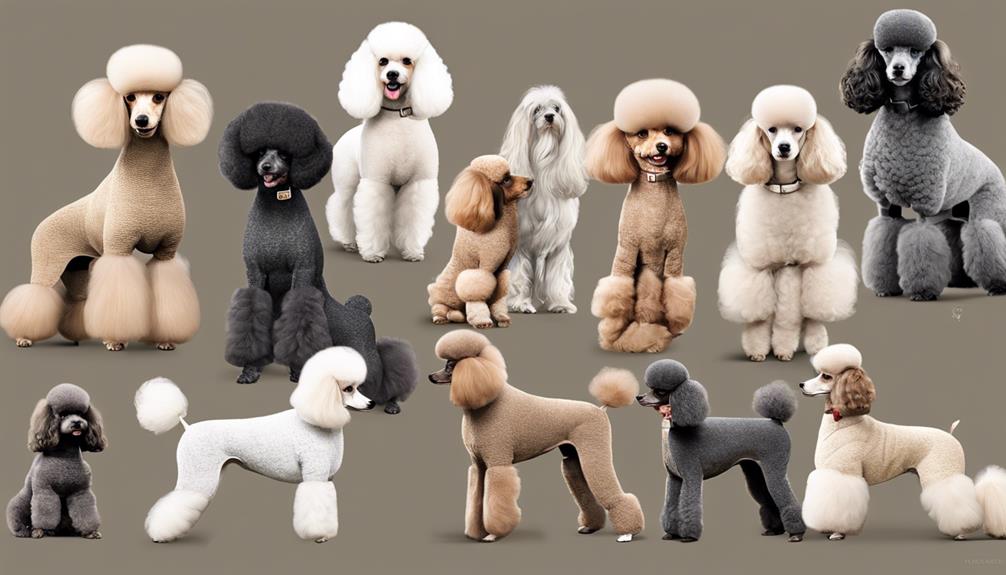
Poodles have a rich history that dates back to their origins as skilled water retrievers. From their humble beginnings as hunting dogs, Poodles transformed into beloved companions of European nobility.
As we investigate the journey of Poodles from the past to the present, we'll explore the evolution of Poodle breeds, the growth of their popularity, and the notable individuals who've been proud owners of these elegant dogs.
Evolution of Poodle Breeds
As Poodle breeds evolved over time, they adapted to varying lifestyles and purposes, resulting in distinct sizes and characteristics.
- Standard Poodles were originally bred as water retrievers and working dogs, showcasing their intelligence and versatility.
- The development of Miniature and Toy Poodles catered to the need for smaller companions and show dogs, fitting well into urban environments.
- The distinctive coat of Poodles, initially practical for protection in water, evolved into a fashion statement, adding to their charm and elegance.
Poodles have a rich history of breeds development, shifting from their role as working dogs to beloved companions and show dogs, all while maintaining their unique characteristics and versatility among dog breeds.
Poodle Popularity Growth
Poodle popularity has consistently grown over time, reflecting their adaptability and appeal across different lifestyles and social statuses. The surge in popularity during the 19th century marked a significant shift for Poodles, evolving from hunting roles to cherished companions. Their association with French nobility catapulted them into favor among European royalty, showcasing their versatile and intelligent nature.
Poodles further solidified their place by excelling as service and therapy dogs, meeting various needs with grace. The introduction of Miniature and Toy Poodles tailored to urban lifestyles enhanced their appeal, while their success as show dogs added to their enduring popularity and recognition. This journey from functional roles to beloved pets highlights the Poodles' ability to captivate hearts and minds across generations.
Famous Poodle Owners
During various historical periods, eminent figures across different fields have embraced the companionship of these elegant canines.
- Queen Elizabeth I: The famous English monarch was a proud Poodle owner, illustrating the breed's popularity among royalty.
- Pablo Picasso: The renowned artist cherished his Poodle named Lump, showcasing the breed's appeal to creative individuals.
- Jackie Kennedy: The former First Lady of the United States had a Poodle named Gaullie, reflecting the breed's presence in high-profile circles.
These famous individuals, including entertainers like Barbra Streisand with her beloved Poodle Samantha, and the late comedian Robin Williams with his Poodle Leonard, demonstrate the enduring allure of Poodles in the lives of celebrities and high-profile personalities.
Poodle Historical Significance
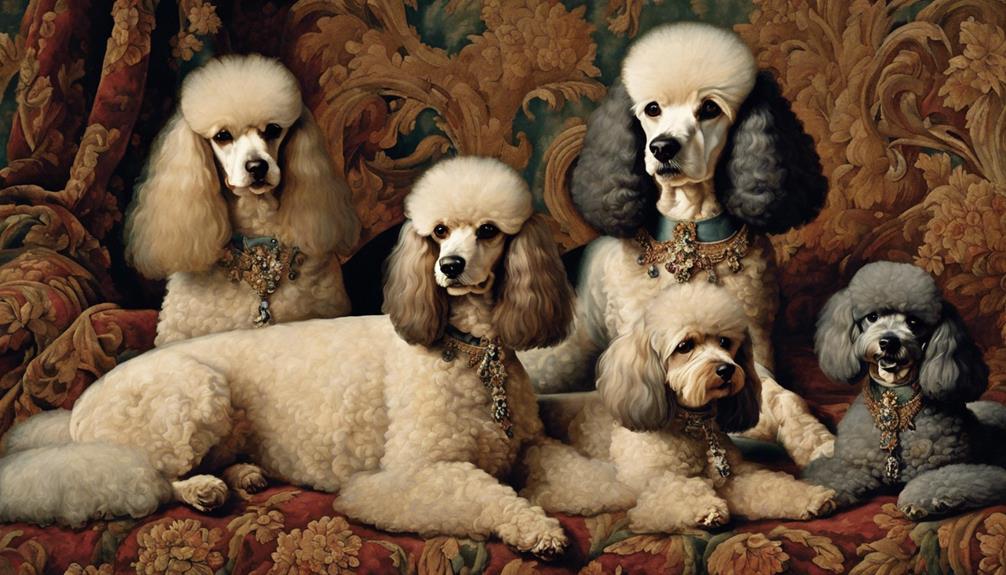
Initially bred in Germany for their exceptional swimming skills and curly coat, the Poodle holds a significant place in history as a skilled water retriever. The breed's history is deeply rooted in its ability to aid hunters and fishermen with retrieving game from water. Poodles, often referred to as the "Standard Poodles" back in history, were highly known for their intelligence, agility, and adaptability in various terrains. Their curly coat served a practical purpose in protecting them from the cold waters during their retrieval tasks. The breeding of Poodles over time has resulted in different sizes, such as Standard, Miniature, and Toy, each serving various roles but still carrying the legacy of their water retrieving ancestors. Below is a table summarizing the historical significance of Poodles:
| Trait | Historical Significance |
|---|---|
| Swimming Skills | Exceptional abilities as water retrievers |
| Curly Coat | Protection in cold waters |
| Intelligence | Adaptability in different terrains |
Poodles Role in Society
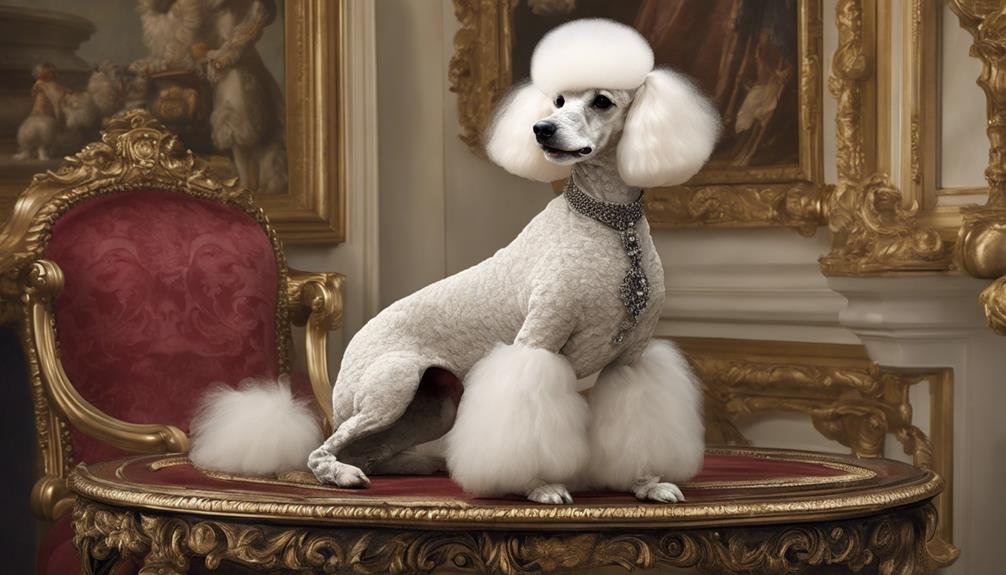
Having evolved from their origins as skilled water retrievers, Poodles have shifted from being hunting dogs to cherished companions for European nobility, highlighting their loyalty and affectionate nature. Their ability to form strong bonds with humans has endeared them to many as loving household pets.
Poodles excel in various service roles, such as therapy work, due to their hypoallergenic coat and gentle demeanor. Their adaptability and obedience make them well-suited for supporting individuals in need, showcasing their versatility in aiding others.
Poodles are known for their prowess in obedience and agility activities, participating in dog sports that demonstrate their intelligence and quick learning abilities. Their capability to excel in these areas underscores their versatility and adaptability in various competitive settings.
Genetic Health Concerns in Poodles

To address genetic health concerns in Poodles, responsible breeding practices and regular health screenings are essential for minimizing risks and ensuring the well-being of these beloved companions. Poodles are prone to genetic diseases such as hip dysplasia, bloat, dental issues, patellar luxation, and eye disorders. By prioritizing responsible breeding and conducting thorough health screenings, owners can proactively manage these potential health issues.
Veterinary check-ups play an important role in early detection and treatment of genetic predispositions in Poodles, helping to maintain their overall health and quality of life. Understanding the specific genetic predispositions of Poodles empowers owners to provide appropriate care and monitor their furry friends effectively.
Poodles in Popular Culture
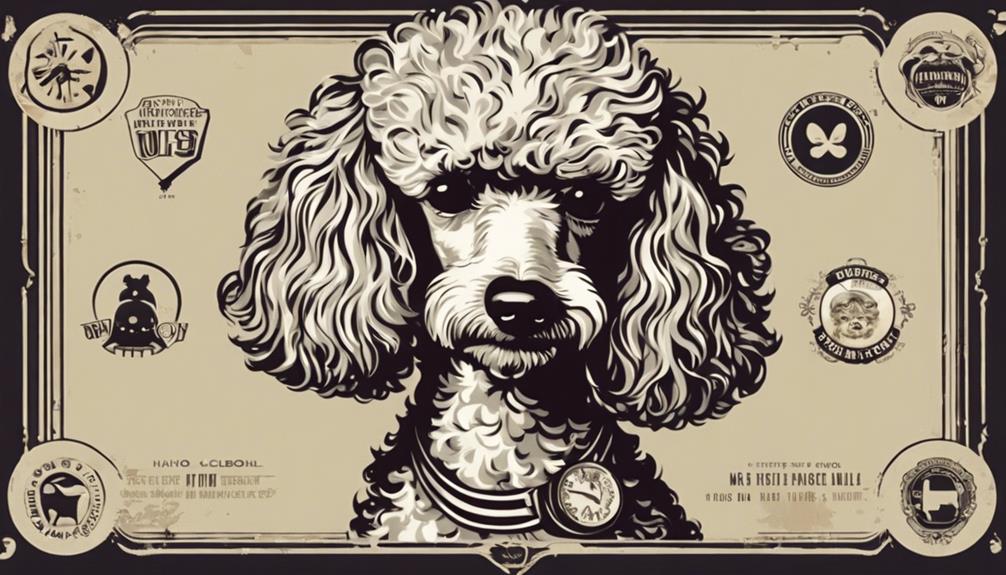
Poodles have left a paw print in popular culture through their elegant presence and intelligent charm, enchanting audiences across various media platforms.
- Famous poodles like Lady from Lady and the Tramp have become iconic figures, showcasing the breed's endearing qualities and charming personalities on the big screen.
- Rufus from Legally Blonde is another beloved poodle character that has solidified the breed's reputation as sophisticated and intelligent companions in popular films.
- Poodles' frequent appearances in TV shows and commercials highlight their versatility as performers and their ability to connect with audiences through their elegant demeanor and graceful movements.
These portrayals reflect the breed's enduring appeal, as poodles are often depicted as intelligent, loyal, and charming creatures that effortlessly capture the hearts of viewers. Whether gracing the silver screen or adding flair to a commercial, poodles continue to shine as elegant and sophisticated characters in popular culture, showcasing their unique blend of grace and intelligence.
Frequently Asked Questions
What Was the Origin of the Poodle?
It is understood that the Poodle originated in Germany in the 15th century. The name 'Poodle' comes from 'Pudel,' meaning 'to splash in water.' Originally bred as water retrievers, Poodles evolved into noble companions and show dogs, highlighting their versatile nature.
What Is the Ancestor of Poodles?
We believe the ancestor of Poodles is the German water retriever, known as Pudel in German. Poodles' ancestors excelled at water retrieval for hunters and fishermen in Germany, showcasing their curly coats and webbed feet.
What Is the History of Poodles Hunting?
Poodles' history in hunting reflects their exceptional skills in water retrieval. Their curly coats and webbed feet made them adept at fetching game during hunts. Their hunting prowess influenced their evolution into beloved companions known for their adaptability and versatility.
What Is the History of the Toy Poodle?
Oh, the history of the Toy Poodle? Let's delve in! These tiny wonders were originally bred for companionship among nobility, packing intelligence and charm in their small frames. They've since become cherished family members, excelling in diverse activities.
Conclusion
To sum up, the poodle's name has a captivating history that dates back centuries. From its origins as a skilled water retriever to its modern-day status as a beloved companion, the poodle breed has certainly left its mark on society.
Despite genetic health concerns, poodles continue to be popular pets and icons in popular culture. So next time you see a poodle prancing down the street, remember the rich history behind this iconic breed.
As our Editor-in-Chief, James plays a pivotal role in ensuring the quality and integrity of our content. With a keen eye for detail and a passion for storytelling, James oversees the editorial process here at A Place for Animals. With years of experience in content editing, James ensures that every piece of content meets our high standards of accuracy and clarity. Under James’ guidance, you can rest assured that the content you read is informative and impeccably crafted.
Dogs
How to Calm Your Canine When Your Dog Wont Settle Down
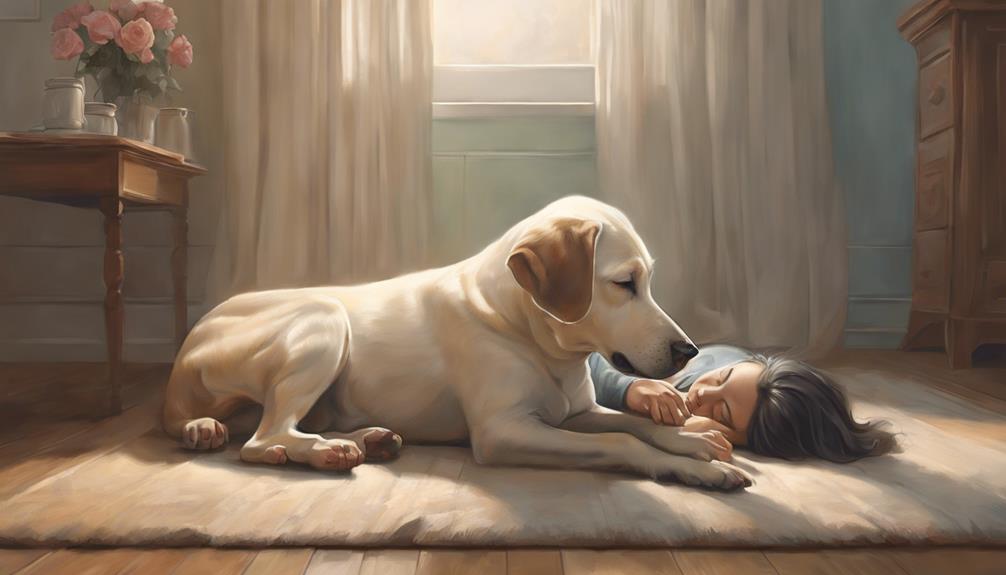
When your dog won't settle down, notice stress signals like excessive barking or pacing. Create a calm space with soothing music and comfort items. Teach tricks for focus and use interactive toys. Stick to a daily routine for stability. Check for health issues that may affect behavior. Visit a vet for help if needed. Understanding your dog's cues is essential for a peaceful environment.
Key Takeaways
- Identify stress signals: Watch for body language cues like pacing and panting.
- Create a calming environment: Minimize noise, use calming pheromones, and provide a safe space.
- Engage in calming activities: Teach tricks, use interactive toys, or try gentle exercises.
- Maintain consistent routines: Establish stability with predictable schedules for meals and playtime.
- Address health concerns: Regular screenings, proper nutrition, and vet assessment for behavioral triggers.
Recognizing Canine Stress Signals
We can easily identify our dog's stress signals by observing their behavior closely. Dogs communicate their discomfort through various body language cues such as excessive barking, pacing, panting, or restlessness. Additionally, dilated pupils, trembling, hiding, or even aggressive behavior can indicate stress in our furry friends.
By recognizing these signs, we can better understand when our dog is feeling overwhelmed or anxious. Understanding our dog's stress signals is vital because it helps us respond appropriately to help soothe them. When we observe these signs promptly and take action to address them, we can prevent the escalation of anxiety in our dogs.
Paying attention to our dog's body language and behaviors is key to creating a harmonious environment for them. By being attentive to their stress signals, we can improve our ability to calm and comfort our canine companions effectively.
Creating a Calming Environment
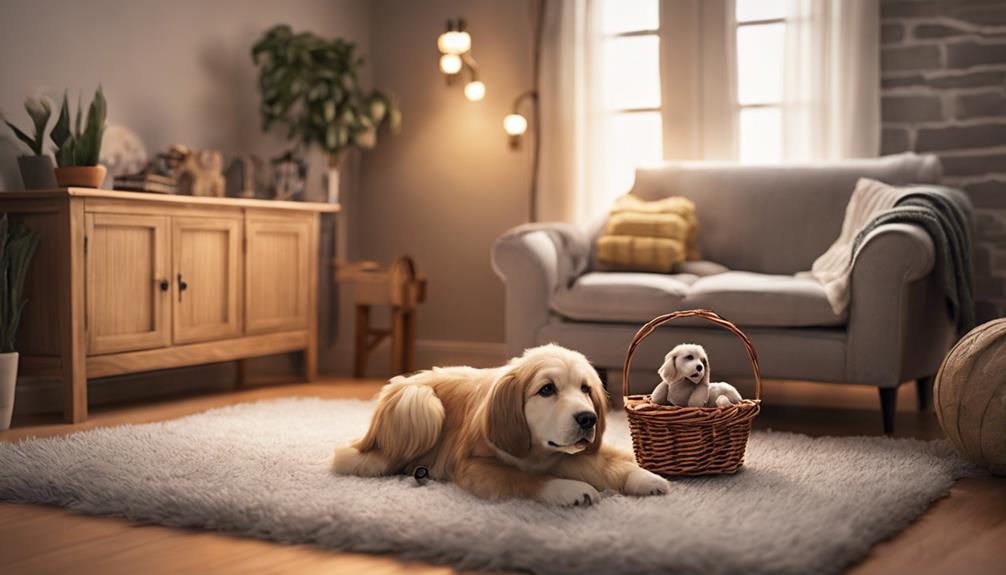
Setting up a serene atmosphere can aid in calming your dog when it's restless. To assist your dog relax, make sure the environment is quiet and free from loud noises or distractions.
Consider using calming pheromones, music, or white noise to create a soothing atmosphere that can help your dog unwind. Providing a comfortable bed or blanket in a designated safe space can promote relaxation and a sense of security for your furry friend.
It's also important to maintain a consistent daily routine for meals, playtime, and rest to help your dog establish a predictable schedule, which can reduce anxiety. Additionally, you may want to explore using anti-anxiety wraps or vests that provide gentle pressure, helping to calm your dog during stressful times.
Engaging in Calming Activities
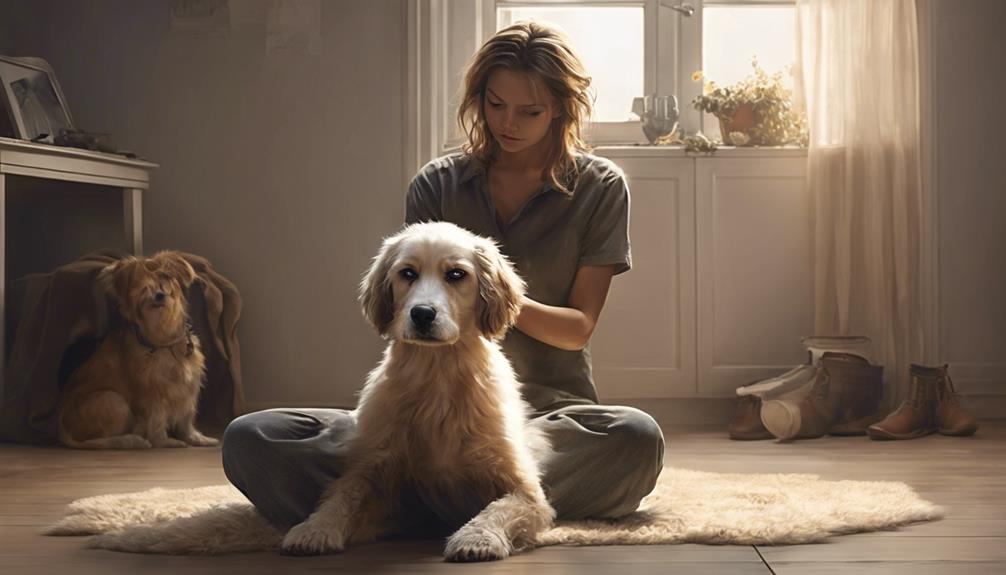
Engaging in calming activities with your dog, such as gentle massages or cuddling, can help promote relaxation and bonding. Here are some ways to help your dog unwind and find peace:
- Teaching Your Dog: You can teach your dog simple tricks or commands that require focus and concentration, helping to redirect their energy in a positive way.
- Help Your Dog: Provide interactive toys or puzzles that will mentally stimulate your dog, keeping them engaged and preventing boredom or restlessness.
- Calming Exercises: Consider incorporating calming exercises like deep breathing or gentle stretching to help your dog relax their body and mind.
- Creating a Soothing Environment: Use calming pheromones or essential oils to create a peaceful atmosphere that can help your dog feel secure and at ease.
Implementing Consistent Daily Routines
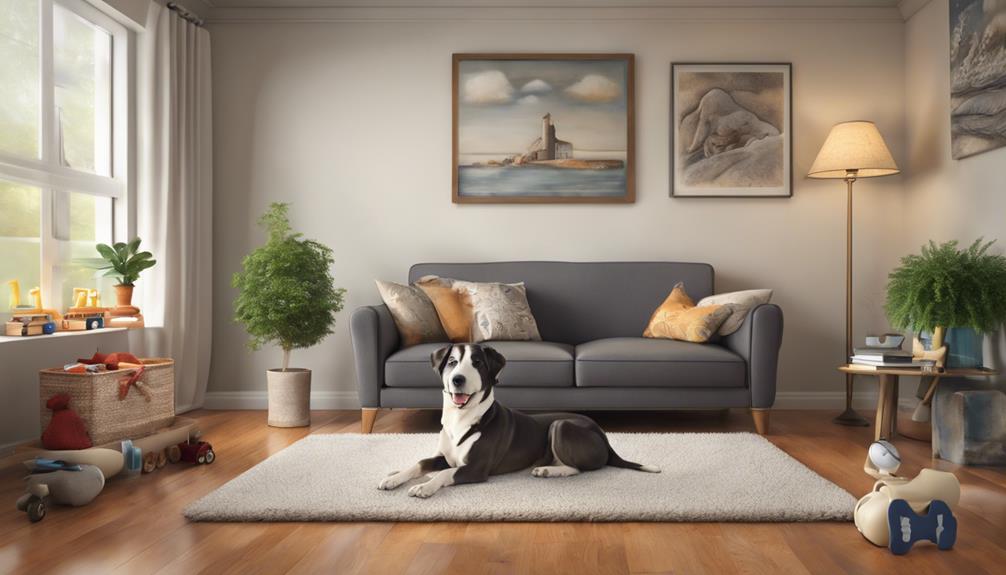
Implementing consistent daily routines is essential for providing structure and stability in your dog's life. When you train your dog to expect regular feeding times, exercise schedules, and play sessions, it helps them know what to anticipate each day. This predictability can reduce anxiety and restlessness in your furry friend.
As you move around your daily activities, your dog gets accustomed to the rhythm of the day and feels more secure. Dogs thrive on routine, so sticking to a consistent schedule can have a calming effect on them. By establishing a set routine, you're creating a sense of normalcy that can help your dog feel more at ease and content.
Addressing Underlying Health Concerns
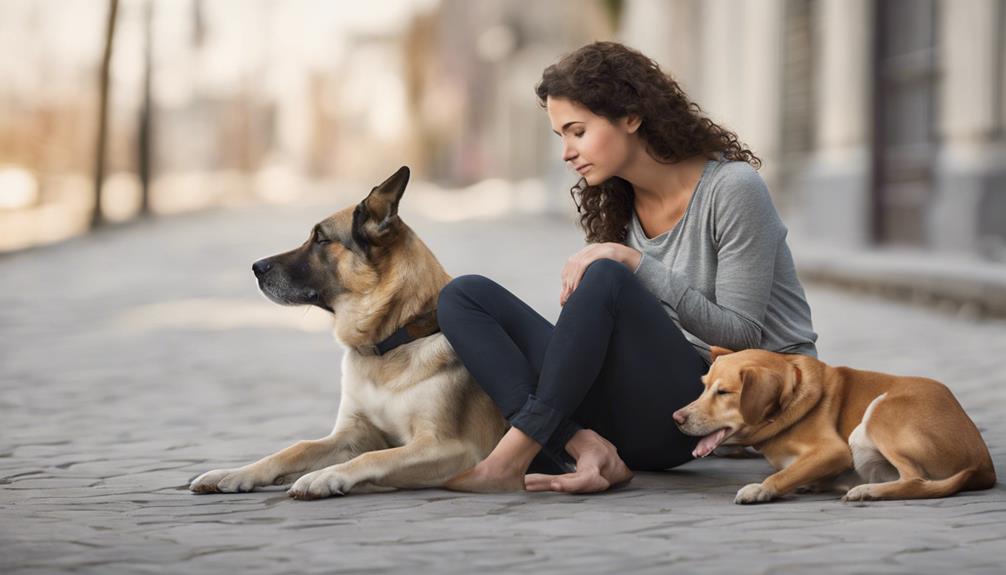
When your dog won't settle down, it's important to evaluate their health.
We need to examine health screening, assess nutrition impact, and check for behavioral triggers.
Health Screening Importance
Regular health screenings play an essential role in uncovering underlying health issues that may be contributing to your dog's restlessness.
- Identify Problems Early: Catching health issues early can lead to better treatment outcomes.
- Preventive Care: Regular check-ups help prevent potential health problems.
- Peace of Mind: Knowing your dog is healthy can bring peace of mind.
- Quality of Life: Addressing health concerns can improve your dog's overall quality of life.
Make sure your dog receives routine health screenings to guarantee they're in the best possible health. Consulting with a vet for a thorough evaluation can help pinpoint any underlying health issues causing your dog's restlessness.
Nutrition Impact Check
Guaranteeing your dog's diet aligns with their specific nutritional needs is essential for addressing underlying health concerns that may be contributing to their restlessness. When a dog starts exhibiting restless behavior, a thorough evaluation of their diet is pivotal.
Imbalanced diets can lead to issues like digestive discomfort, allergies, or nutrient deficiencies, impacting your dog's behavior. Seeking professional help from a veterinarian is essential to make sure your dog is receiving the right nutrients tailored to their age, breed, and health condition.
High-quality, balanced dog food with essential nutrients can support overall health and potentially aid in calming your canine companion. By addressing any nutritional deficiencies or sensitivities through proper diet adjustments, you can help improve your dog's well-being and behavior.
Behavioral Triggers Assessment
Let's explore evaluating the behavioral triggers in your dog to address any underlying health concerns that may be contributing to their restlessness.
- Assess your dog's health: Look for signs of discomfort or pain like limping, changes in appetite, or excessive scratching.
- Consult with a vet: Rule out medical issues such as arthritis, dental problems, or gastrointestinal concerns.
- Address health problems promptly: Alleviating discomfort can help your dog to be calm and contribute to a more settled demeanor.
- Behavioral triggers assessment: Identify the root cause of your dog's restlessness to implement appropriate solutions for a calmer pet.
Seeking Professional Guidance if Needed
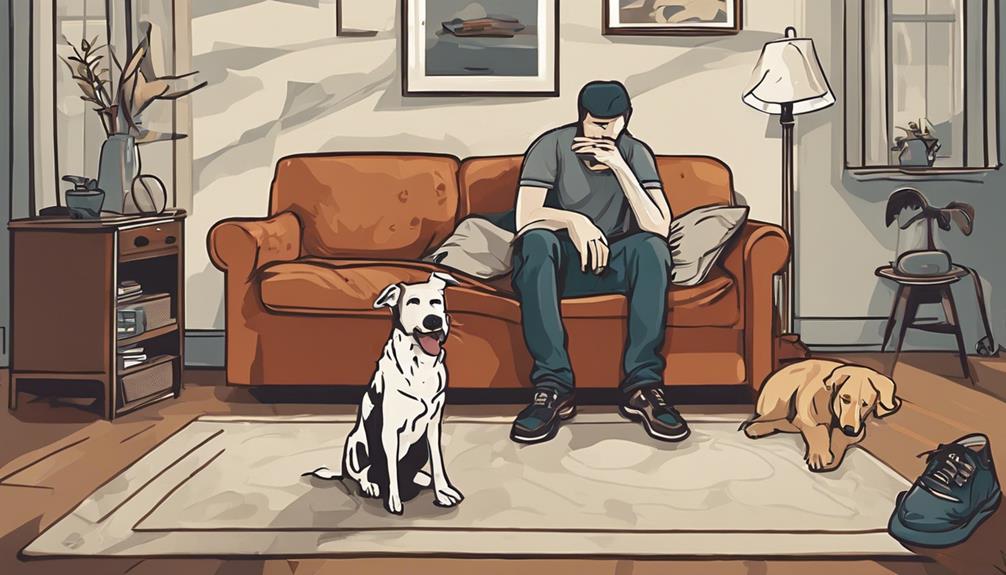
If expert assistance is needed for addressing your dog's restlessness, consulting a certified dog trainer or behaviorist can provide customized solutions. These specialists can observe your dog's behavior, assess triggers, and recommend specific techniques to help calm your canine companion. Additionally, they can offer personalized training plans to address any underlying issues contributing to your dog's inability to settle down. Below is a table outlining the advantages of seeking professional guidance:
| Benefits of Professional Guidance |
|---|
| Tailored solutions for your dog's behavior |
| Expert evaluation of triggers |
| Personalized training plans |
| Customized strategies for calming your dog |
Frequently Asked Questions
What to Do With a Dog That Won't Settle Down?
If your dog won't settle down, try identifying the root cause. Provide a cozy environment and engage in calming activities like gentle massage or soothing music.
Consider natural calming aids or supplements recommended by a vet. Consult with a professional trainer for personalized strategies.
How Do I Calm My Dog Down Asap?
When your dog needs to chill ASAP, try engaging them in calming activities like petting or massage. Utilize calming aids such as essential oils or pheromone diffusers.
Put on calming music or white noise to drown out stress triggers. Offer a special treat or toy for distraction and comfort.
Practice deep breathing exercises together to regulate breathing and promote relaxation. These methods can swiftly help your furry friend settle down in no time.
How Do You Get a Hyper Dog to Settle Down?
To help a hyper dog settle down:
Create a safe and quiet space conducive to relaxation. Engage in positive reinforcement training to encourage calm behavior. Provide physical exercise and mental stimulation for relaxation. Consider calming aids recommended by vets.
Consult a certified trainer for tailored solutions. Remember, patience and consistency are key to helping your hyper dog find peace and tranquility.
What Does It Mean When Your Dog Can't Settle?
When your dog can't settle, it's a red flag signaling potential stress, discomfort, or health issues. Restlessness might indicate anxiety, fear, or insecurity. Watch out for behaviors like pacing, panting, whining, or excessive attention-seeking.
Pinpointing the root cause is key to proper care. To help your furry friend relax, try calming methods, provide a safe space, and consider seeking expert guidance. Understanding the cues your dog gives can lead to a happier, settled pup.
Conclusion
To sum up, when your dog won't settle down, it's important to understand their stress signals and create a calming environment for them.
Engaging in soothing activities and sticking to consistent daily routines can also help alleviate their anxiety.
Remember, addressing any underlying health concerns is vital for your furry friend's well-being. Seeking professional guidance if needed is always a good idea.
By taking these steps, you can help your canine companion relax and feel at ease.
Dana is our Lead Content Writer, bringing a wealth of knowledge and expertise to our team. With a background deeply rooted in animal studies and a profound love for all creatures, Dana is dedicated to crafting engaging and informative content that resonates with our audience. With Dana at the helm, you can trust that our content is accurate and engaging, catering to the diverse interests of animal enthusiasts everywhere.
-
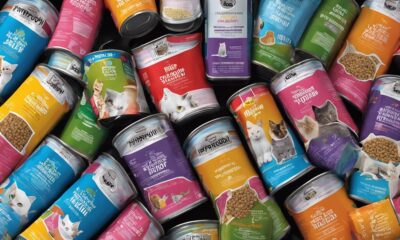
 Vetted2 months ago
Vetted2 months ago15 Best Cat Foods for Managing Hyperthyroidism – Vet Approved and Feline Friendly
-
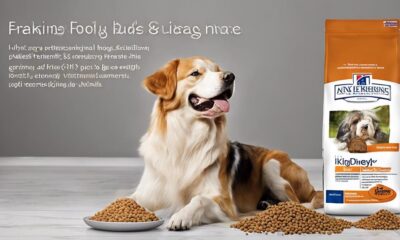
 Vetted2 months ago
Vetted2 months ago15 Best Dog Foods for Kidney Disease – Expert Recommendations for Your Pet's Health
-
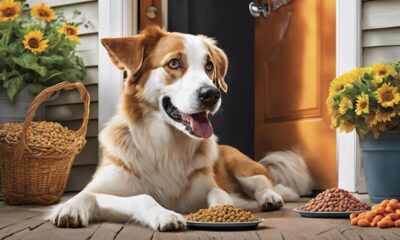
 Vetted2 months ago
Vetted2 months ago15 Best Fresh Dog Food Delivery Services for Your Pup's Health and Happiness
-

 Animal Facts2 months ago
Animal Facts2 months agoSpring Animals: A Guide to Seasonal Wildlife
-

 Vetted2 months ago
Vetted2 months ago15 Best Wet Cat Foods for Older Cats to Keep Them Healthy and Happy
-

 Cats1 month ago
Cats1 month agoCat Weight Chart by Age: Kitten to Senior in Lbs
-

 Cats1 week ago
Cats1 week agoTop 5 Cat Breeders in Arkansas: A Guide
-

 Vetted2 months ago
Vetted2 months ago14 Best Homemade Dog Food Recipes Your Pup Will Love – Vet Approved & Nutritious




